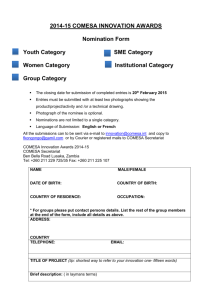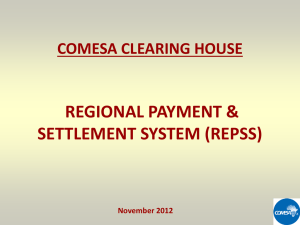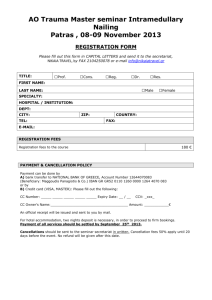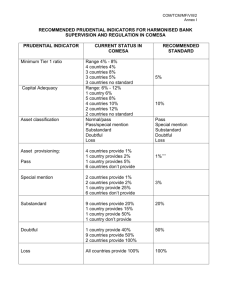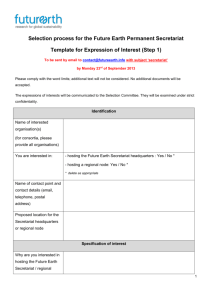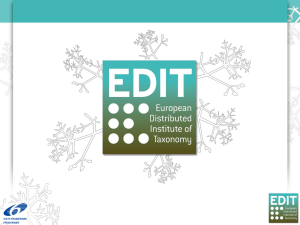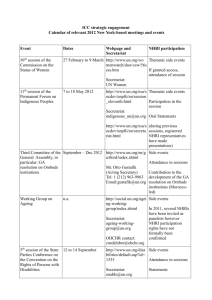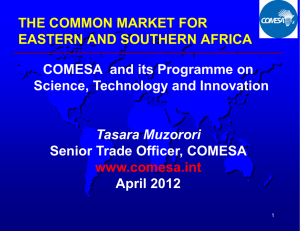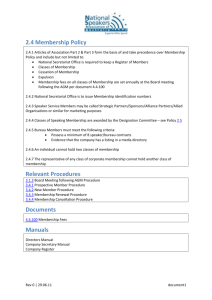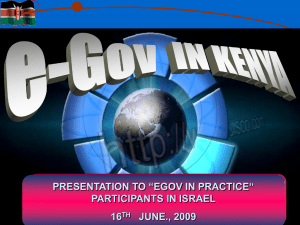Final Report of 6th IT-TCM - comesa programmes
advertisement
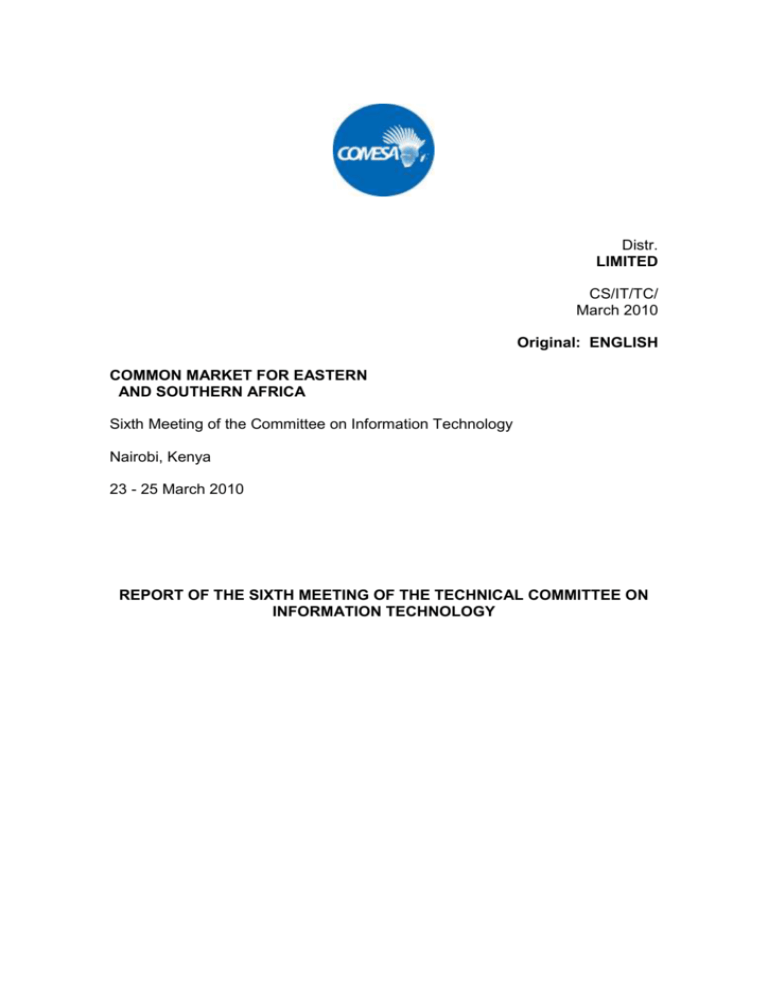
Distr. LIMITED CS/IT/TC/ March 2010 Original: ENGLISH COMMON MARKET FOR EASTERN AND SOUTHERN AFRICA Sixth Meeting of the Committee on Information Technology Nairobi, Kenya 23 - 25 March 2010 REPORT OF THE SIXTH MEETING OF THE TECHNICAL COMMITTEE ON INFORMATION TECHNOLOGY LIST OF ACRONYMS ASYCUDA CIRT COMESA COMTEL EAC EASSY EDF FOSS GIS GIXP ICT ITU KeLC MoU REC RIXP RMCE SAN TIA UN UNCITRAL UNCTAD UNECA UNPAN Automated System for Customs Data Computer Incidents Response Team Common Market for Eastern and Southern Africa COMESA Telecommunications Company East African Community East African Submarine Cable System European Development Fund Free and Open Source Software Geographical Information Systems Government Internet Exchange Point Information and Communications Technology International Telecommunications Union Kenya e-Learning Centre Memorandum of Understanding Regional Economic Communities Regional Internet Exchange Point Regional Multi-disciplinary Centre of Excellence Storage Area Network Telecommunications Industry Association United Nations United Nations Commission on International Trade Law United Nations Conference on Trade and Development United Nations Economic Commission for Africa United Nations Public Administration Network CS/IT/TC/V/7 Page 2 A. INTRODUCTION 1. The Sixth Technical Committee Meeting on Information Technology was held from 23rd to 25th March 2010 at the Hilton Hotel in Nairobi, Kenya. B. ATTENDANCE, OPENING OF THE MEETING, ADOPTION OF THE AGENDA AND ORGANIZATION OF WORK Attendance 2. The meeting was attended by delegates from Egypt, Kenya, Madagascar, Malawi, Seychelles, Sudan, Uganda, Zambia and Zimbabwe. The East African Community (EAC) was also represented. The list of participants is attached as Annex I. Opening Session (Agenda item 1) Opening Remarks 3. An opening statement was made by the Director of Information and Networking of the COMESA Secretariat, Mr. Sherin Shoukry, on behalf of Mr. Sindiso Ngwenya, the Secretary General of COMESA. 4. He thanked the people and the Government of the Republic of Kenya for their warm welcome and facilities provided, and urged the committee to remain focused in its programme of ensuring that the region becomes a knowledge society, in line with the developments in the rest of the world and reminded them that Information and Communications Technologies (ICTs) were a critical factor in ensuring the social and economic development of the region. 5. Mr. Shoukry highlighted the agenda items that were going to be discussed in the meeting and emphasized on the outcomes of the study on Free and Open Source Software and on the regional Data Center. A comprehensive progress report was also going to be given to show progress made on the previous council decisions. 6. He concluded by wishing the meeting fruitful deliberations and encouraging them to come up with sound recommendations which would have impact on the region. 7. A welcome statement was delivered by Dr. Bitange Ndemo, Permanent Secretary in the Ministry of Information and Communications of the Republic of Kenya on behalf of Honourable Samuel Poghisio, the Minister of Information and Communications. 8. The Permanent Secretary started by giving the meeting an update on the EASSY fibre cable which had landed the previous day in Mombasa and was launched by the Minister of Information and Communications. CS/IT/TC/V/7 Page 3 9. He mentioned that this had improved communication beyond imagination but that there were still a number of challenges especially as regards local content, and there was an even greater need for the region to work out modalities on how best countries may link together to share connectivity, especially for the land-locked countries. 10. Data centers for storage and backing up of the organisation’s data from the various information systems was a critical factor for the development of ICT and he then gave examples of how the Kenyan government was proposing to assist ICT businesses to develop and he highlighted a KSH10bn investment for a multi-media science park to be developed in phases over a period of ten years. He pointed out that Kenya has seen how ICT’s can contribute effectively to good governance and increase in revenue through their effective application in areas such as digitisation of the national land and company registries. 11. He emphasised the need for the region to embrace ICT’s as an important tool for national and regional development and went on to highlight the achievements of Kenya in the area of ICT. He added that based on the Common Market for Eastern and Southern Africa (COMESA) Model adopted by the COMESA Council of Ministers in March 2003, Kenya’s national ICT policy aims to encourage sustained economic growth and poverty reduction, promote social justice and equity, mainstream gender in national development, empower youth and disadvantaged groups, stimulate investment and innovation in ICT, and achieve universal access. 12. He was therefore proud to inform the meeting that with the policy as a guiding factor, Kenya has seen significant positive changes in the ICT sector over the last ten years. 13. The delegate from Malawi delivered a vote of thanks. In his statement, the delegate thanked the Government of Kenya for hosting the meeting and encouraged his fellow delegates to effectively deliberate and meet the expectations of the Minister and the region in effectively implementing the ICT programmes. He urged his colleagues to join hands and work as a team in order to achieve the purpose of the committee. Election of the Bureau (Agenda item 2) 14. A bureau was elected to preside over the deliberations of the meeting as follows: Chairperson Vice Chairperson Rapporteur : : : Kenya Uganda Seychelles Adoption of the Agenda and Organization of Work (Agenda item 3) 15. The meeting adopted the agenda and the organisation of work as follows: CS/IT/TC/V/7 Page 4 1. 2. 3. 4. 5. 6. 7. 8. 9. 10. 11. 16. Opening of the Meeting Election of the Bureau Adoption of the Agenda and Organisation of Work Progress Report from the Secretariat a. Update on the IT Master Plan b. E-Legislation c. GIS d. Regional Centre of Excellence e. Charging Policy f. E-Government g. E-Learning h. ICT Trade Facilitation – Customs Modernisation Cyber Security FOSS Study and the Proposed Way Forward on FOSS Microsoft Presentation Outcomes of the study on the Regional Data Centre WorkPlan 2010 Any Other Business Adoption of the Report and Closure of the Meeting The meeting adopted the following working hours: Tuesday 23rd March, 2010 : th Wednesday 24 March, 2010 : Thursday 25th March, 2010 : C. 09:00hrs - 17:00hrs 09:00hrs - 16:00hrs 09:00hrs – 14:00hrs ACCOUNT OF PROCEEDINGS Progress Report from the Secretariat (Agenda item 4) 17. A detailed and comprehensive progress report from the Secretariat was presented to the meeting. The meeting highlighted the achievements made since the fifth technical committee meeting which was held in Mahe, Seychelles as well as the challenges faced in the implementation of some of the programmes. 18. The decisions of the Council meetings of June, 2009 were highlighted as: E-Legislation (a) Member States are urged to accede to the UN Convention on the Use of Electronic Communications in International Contracts (2005), and to incorporate the provisions of the Convention in their respective national laws, particularly, in view of the launch of the Customs Union. Member States are therefore encouraged to set a deadline for the enactment of these laws; (b) The Secretariat should develop regulations to enable member States facilitate secure electronic transactions; (c) The COMESA Court of Justice should be empowered to facilitate online mediation to resolve disputes that may arise from electronic CS/IT/TC/V/7 Page 5 transactions; and (d) COMESA’s e-Legislation programme should have a component on eWaste, specifically to outline how such waste should be disposed of in the Member states. IT Master Plan (a) The Secretariat should update the IT Master Plan to include the proposed programmes and projects and list them in the order of the suggested priorities; (b) Member States are encouraged to develop standard information systems which may be shared with other Member States; and (c) Member States should share their respective I.T. Master Plans and ICT policies with the Secretariat. Geographical Information Systems (GIS) (a) The Secretariat should create an enabling environment for Geographical Information Systems (GIS) to facilitate informed decision-making for the region’s programmes; and (b) Member States should collaborate with the Secretariat to provide the necessary data from various programmes to facilitate the development of useful regional GIS applications. ASYCUDA a) Member States should provide the necessary resources to support, maintain and modernise Customs systems, based on options provided in the study on sustainability, with high-level government support; b) The Secretariat should set up a Regional Customs Modernisation Centre to assist in customs modernisation and capacity building which will ensure ownership by COMESA of the implementation process; c) The Secretariat, with UNCTAD support should develop an ASYCUDA online training for delivery on the COMESA e-Learning platform; d) The Secretariat should provide a link on its web portal to the ASYCUDA website to facilitate discussions and sharing of information; e) Member States should consider a staff retention strategy to ensure continued support of ASYCUDA systems; f) UNCTAD and COMESA Secretariat should work out a strategy for the upgrading of ASYCUDA implementation in the region. Regional Center of Excellence a) Council decided that the Secretariat should work closely with Mauritius to fast-track the completion of the paper on the Regional Centre. CS/IT/TC/V/7 Page 6 Charging Policy a) Council decided that the Secretariat should identify the appropriate mechanisms for implementation as a means of sustainability of information systems. Free and Open Source Software a) Council decided that Member States should update their ICT policies to include FOSS. E-Government Programme (a) Member States should ensure that the e-Government programme is given prominence and led at the highest political level; (b) The Secretariat should collaborate and harmonise with other Regional Economic Communities in the implementation of the eGovernment programme; (c) The Secretariat is urged to establish modalities for capacity development within the e-Government programme; (d) Member States are encouraged to have a link to the e-Government portal from their national e-Government portals; and (e) Member States should provide the COMESA Secretariat with their focal points on e-Government programmes to ensure the provision and relevance of information on the portal. E-Learning Programme (a) The Secretariat should enter into a Memorandum of Understanding with the Kenya e-Learning Center to ensure maximum operation of the installed e-Learning platform; (b) The Secretariat should organise a workshop on e-Learning Strategies to work out the implementation modalities for the MoU; And (c) Member States should provide the Secretariat with their e-Learning focal points for the successful implementation of the e-Learning programme. Regional Data Centre (a) Council decided that the Secretariat should conduct a study to draw up the Terms of Reference for setting up of a data centre for effective storage of the information that it hosts in the various systems and to serve as a regional infrastructure to promote secure electronic transactions (b) Council decided that the Secretariat should pursue the CS/IT/TC/V/7 Page 7 implementation of the work plan for IT and prioritize for implementation as approved in the IT Master Plan. 19. The meeting was then informed that these Council decisions had been presented to the third meeting of Ministers responsible for transport, communications and energy for noting in Djibouti in October, 2009. 20. The Secretariat then proceeded to inform the meeting of the progress which had so far been made as regards these Council decisions. 21. The meeting considered and commented further on terms of reference and concept papers which had been prepared, and studies which had been completed. The terms of reference, concept papers and studies reviewed by the meeting were on: The IT Priority Master Plan A paper on regional systems which may be developed Development of regulations to facilitate secure electronic transactions A COMESA e-Waste programme Means of Sustainability for COMESA Information Systems Regional customs modernisation training strategy Terms of Reference for Capacity Development for the e-Government programme The Memorandum of Understanding between the Estonia eGovernance Academy and COMESA on technical assistance in the establishment of a regional e-governance Academy The Memorandum of Understanding between the United Nations Public Administration Network (UNPAN) and COMESA on collaboration on the e-Government programme The Memorandum of Understanding on e-Learning between the COMESA Secretariat and the Government of Kenya The FOSS Study A plan for implementing the FOSS programme The Study on the Regional Data Centre a. IT Master Plan CS/IT/TC/V/7 Page 8 22. The meeting was requested to review the IT Master Plan which had been earlier circulated to them for their comments. They were requested to consider it as an IT Priority Master Plan which would have the priority IT activities and programmes for implementation. A further call was made to the Member States requesting them to share their IT Master plans and policies with the Secretariat. 23. The meeting then considered a paper which outlined regional information systems which could be developed and which would be beneficial to the Member States. The two proposed systems were a cross-border traders information system and an online business directory. 24. Regarding the setting up of a Regional Internet Exchange Point (RIXP), the meeting noted that this issue was being discussed under the COMTEL project. The meeting also learnt that the Government of Kenya was in the process of setting up a Government Internet Exchange Point (GIXP) to keep government traffic within the government network and enhance security and confidentiality of government data. 25. A presentation was made on the utilisation of IT in the COMESA region. Efforts were being stepped up in line with the cooperation of the regional economic communities (REC’s) under the tripartite arrangement for information sharing and harmonization among the REC’s and the Member States. Recommendations 26. The meeting made the following recommendations: (i) COMESA Secretariat should carry out a thorough requirements analysis to ascertain the needs of the two systems (ii) Member States should provide the required data for the regional information systems once they become operational (iii) COMESA Secretariat should expedite the implementation of the Regional IXP as part of COMTEL. b. E-Legislation Programme 27. The programme on e-Legislation aims to ensure that the current legal and regulatory framework within the member states meets the needs of citizens, businesses and governments in the adoption and exploitation of e-Commerce applications and in the use of the Internet in general. 28. The meeting was informed that COMESA had engaged both the UNCITRAL and UNECA for collaboration in the implementation of the e-legislation programme and programmes had been agreed which would assist countries in the accession to the UN Convention and also in building the capacity in the member States in eLegislation. 29. Terms of reference had also been prepared and a Consultant was being recruited to undertake a study to develop regulations to facilitate secure electronic transactions. The meeting was informed that the draft regulations, once completed, would be submitted to the legal drafting sub-committee of COMESA, and then CS/IT/TC/V/7 Page 9 thereafter to the committee of Legal Experts. Once approved by the committee of Legal Experts, the draft would be submitted to the Ministers of Justice. 30. As regards empowering the Court of Justice to facilitate online mediation to resolve disputes that may arise from electronic transactions, the meeting noted that this would be part of the study being undertaken by the Consultant and that a joint workshop was being discussed with UNCITRAL where these matters would be elaborated on. 31. The meeting considered a concept paper on e-Waste which had been prepared by Malawi. After reviewing the paper, the meeting gave updates on developments regarding e-waste at national level and made inputs to improve on the paper and have a way forward for the e-waste component under the e-Legislation programme. Recommendations: 32. The meeting made the following recommendations: (i) COMESA Secretariat should ensure the completion of the draft regulations to facilitate secure electronic transactions as soon as possible; (ii) COMESA Secretariat should conduct a study to draw up a model policy on eWaste for the region c. Geographical Information Systems (GIS) 33. The meeting considered the proposed way forward on the GIS activity that had been prepared in order to ensure the effective utilisation of GIS for informed decision-making for the region’s programmes. 34. The meeting was also informed that the Secretariat was waiting for release of funds for the development of a regional GIS system covering initially the Peace and Security programme of COMESA and the Transport Infrastructure in the COMESA region. 35. Liaisons were also ongoing with the Rwanda Development Board in the development of the GIS system and all member States were urged to collaborate with the Secretariat in the collection of the required data for the GIS systems, as agreed in the draft MoU between COMESA Secretariat and the Rwanda Development Board. Recommendation 36. The meeting recommended that COMESA Secretariat should mobilise resources to implement the proposed two sectors on the GIS roadmap to facilitate decision making and programme implementation d. ASYCUDA CS/IT/TC/V/7 Page 10 37. The meeting was informed that a proposal for a COMESA regional center for custom modernization had been submitted for EDF funding and was expected to start implementation during 2011. Under the current programme, the meeting noted that risk management training had been conducted in Eritrea and a mission had been undertaken to Swaziland to review the status of implementation of ASYCUDA++ in the country and also to find out more on other areas where the country needed support to ensure an effective implementation of ASYCUDA. 38. The meeting further noted that a new member of staff had been recruited to steer and manage the ASYCUDA programme for COMESA. as part of the staff retention strategy to ensure continued support of ASYCUDA systems. Recommendations 39. The meeting made the following recommendations: (i) Member States are urged to provide to the COMESA Secretariat, by end of June 2010, details of their IT and Functional experts in Customs management systems and the trainings already acquired (ii) COMESA Secretariat should conduct a training needs assessment in Customs management systems (iii) COMESA Secretariat should facilitate skills transfer among the member states e. Regional Centre of Excellence 40. The meeting was informed that the proposal for a regional centre of excellence in IT would be taken as part of the broader Regional Multi-disciplinary Centre of Excellence (RMCE) which was being developed in collaboration with the World Bank. Liaisons would continue with Mauritius which was leading the activity for the RMCE. f. Charging Policy 41. The meeting considered the paper presented on the sustainability of information systems. The paper highlighted that a charging policy would not be the only way to ensure the sustainability of information systems but that other means could also be used. The paper therefore discussed the following: Charging Policy; Advertising; Empowerment of member states to provide the content for the systems; Increasing the utilisation of the systems by intended users; Have regularly scheduled reviews for the different applications; CS/IT/TC/V/7 Page 11 Ensuring that the systems always have up to date and relevant content; and Using the latest technologies on the systems. Recommendations: 42. The meeting recommended that COMESA Secretariat should: (i) mobilize resources to ensure the sustainability of the regional information systems (ii) develop guidelines for Member States to ensure sustainable update of content on the web-based systems (iii) recruit a marketing consultant to work on the visibility of the information systems for the organization. g. E-Government Programme 43. The objective of the e-Government programme in COMESA is to contribute to the regional integration agenda through an effective and efficient Information and Communications Technologies (ICT) environment geared towards the reduction of costs of trade and investment to stimulate economic growth and reduce poverty. 44. Specifically, the programme on e-Government will foster the development of information systems to enable easy access to regional information for the promotion of good governance through the application and provision of best practices in Information and Communications Technology (ICT) 45. The meeting was informed that significant progress had been made as regards the implementation of the e-Government programme, especially as regards the activity on capacity development. A mission had been mounted to the Estonia eGovernance Academy where a Memorandum of Understanding is being considered for collaboration in developing an e-government capacity development programme and in the setup of a COMESA regional e-Governance Academy that would be used as a training centre for the Member States in matters of e-Government. 46. A presentation was given via video-conference by a representative of the Estonia e-Governance Academy. He gave a background on the objectives of the academy and on its organisational structure. He then informed the meeting of collaboration currently going on between the Estonian Academy and West African states in setting up an e-governance academy covering West Africa. He then highlighted the need for the proposed COMESA academy to identify, in early stages, the source of financing, stakeholders, customers and the critical success factors for the establishment of the Academy. 47. The meeting was also informed that Uganda had already expressed interest in hosting the proposed COMESA Regional e-Governance Academy and discussions would continue with the Secretariat in realising the regional academy. The criteria for hosting an institution was given to the meeting covering physical infrastructure requirements and the legal and institutional framework as outlined in Article 186 in the COMESA Treaty. CS/IT/TC/V/7 Page 12 48. The meeting also noted that another MoU was being discussed with the United Nations Public Administration Network (UNPAN) for collaboration on eGovernment, and that further collaboration was being sought with SADC and the EAC. 49. The paper developed on the modalities for capacity development within the eGovernment programme proposed that a comprehensive needs assessment should be carried out to determine the capacity development requirements for the region. 50. The meeting also noted that an e-Government portal had been developed and was available on http://egov.comesa.int. Regular statistics on the usage of the system were being produced as well as on the usage of the other information systems that the organisation hosts. The current statistics for the e-Government portal were about 2000 hits per month. 51. The meeting was encouraged to ensure that they submitted the details of their national e-Government portals for linking to the regional e-government portal as well as to submit details of their e-Government national focal points to ensure the provision and relevance of information on the portal. Recommendations: 52. The meeting made the following recommendations: (i)COMESA Secretariat should seek to collaborate in capacity development in e-government through agreements with organisations implementing best practises, to raise capacity in the Member States (ii)Member States that have not provided details of their egovernment focal points to the Secretariat are urged to do so by end June 2010 (iii)COMESA Secretariat, with the focal points from the Member States, should ensure update of content on the e-government portal (iv)COMESA Secretariat together with the Government of Uganda should consider entering into an MoU for collaboration in establishing an e-Governance Academy E-Learning Programme 53. The programme on e-Learning aims to promote the use and appreciation of the e-learning platform at the COMESA Secretariat and in all the member states, and to ensure full utilization of the installed COMESA e-Learning platform. The COMESA e-Learning platform is on http://elearning.comesa.int 54. The meeting learnt that a Memorandum of Understanding was in the process of being signed with the Government of Kenya to ensure maximum operation of the installed e-Learning platform. The lead organisation in Kenya for the operation of the MoU is the Kenya e-Learning Centre, KeLC. Kenya was keen to drive the e- CS/IT/TC/V/7 Page 13 Learning programme and a workshop on e-Learning strategies had been proposed to work out the implementation modalities for the MoU. The workshop would be held once funding was confirmed for the activity. 55. The meeting further noted that a workshop had been held in Nairobi, Kenya by the KeLC in which COMESA participated. The workshop focused on training of eLearning tutors, managers and administrators. 56. As was requested for the e-Government programme, a similar request was made to the member States to provide details of their e-Learning focal points that would ensure the successful implementation of the e-Learning programme at national level. Recommendations 57. The meeting made the following recommendations: (i) COMESA should sign the Memorandum of Understanding with the Government of Kenya as soon as possible to ensure maximum operation of the installed e-Learning platform (ii) COMESA Secretariat should ensure that the workshop on e-Learning is held for effective implementation of the MoU and build capacity within the region in e-Learning (iii) Member States that have not yet provided details of their e-learning focal points to the Secretariat are urged to do so by end June 2010 Cyber Security (Agenda item 5) 58. The meeting was given a brief on previous activities carried out by COMESA in cyber security. Cyber security is one of the priorities under the COMESA ICT Programme. The main activity was a workshop done jointly with the International Telecommunications Union in August, 2008 in Lusaka, Zambia. The main recommendations of the workshop were to establish a working group, develop a regional policy and legislation framework, and design the Computer Incidents Response Team (CIRT). 59. A presentation on cyber security was given focusing on data protection, privacy and copyright acts and laws. The meeting was informed that gaining the trust of customers is vital for the success of any company that requires sensitive data for its operation. Consumers are concerned about identity theft and are reluctant to provide un-trusted sources with personal information. To boost consumer confidence, it is paramount that organisations implement data protection and privacy laws and procedures. 60. Data protection is therefore a fundamental right to privacy and organisations that keep data have to comply with the necessary data protection principles which were highlighted during the presentation. Recommendation: CS/IT/TC/V/7 Page 14 61. The meeting recommended that the COMESA Secretariat should work closely with the International Telecommunications Union (ITU), UNECA, EAC and other regional and international organisations to develop a cyber security policy and legislation framework for the region Free and Open Source Software (FOSS) Programme (Agenda Item 6) 62. The outcomes of the FOSS study were presented to the meeting. The study emphasized on the need to have an improvement on the FOSS policy environment, as well as a sustained and functional awareness programme to ensure capacity building within the region. The study requested further the establishment of the FOSS communities where they do not exist and strengthening the existing ones. 63. The specific objectives of the FOSS programme are to: a. Improve the FOSS Policy Environment in the Member States b. Ensure a sustained and functional awareness creation c. Ensure FOSS Capacity Building within the region d. Promote the growth and reinforcement of the capacities of FOSS communities 64. The meeting noted that Sudan has been denied access to the American Open Source websites, although the definition of Open Source prohibits discrimination “against any person or group of persons.” Recommendations: 65. The meeting made the following recommendations: (i) COMESA Secretariat should develop an implementation plan, and mobilize resources based on the recommendation of the study (ii) Member States are requested to develop policy guidelines on FOSS Microsoft Presentation (Agenda item 7) 66. A representative from Microsoft West, East, Central Africa & Indian Ocean Islands made a presentation on three main areas: Licensing; including the agreement between COMESA and Microsoft for negotiated licensing for the Member States How Microsoft Operates in the COMESA Member States Single Window concept to facilitate trade 67. The presentation was well received by the meeting and several questions were raised from the floor regarding information on Microsoft’s legitimate partners in the Member States, licensing models, training and certification, the details of the single window concept and professional services available from Microsoft. Data Centre (Agenda item 8) CS/IT/TC/V/7 Page 15 68. The meeting noted that the study of 2009 for a data centre had been completed and some of the recommendations had already been taken into consideration to improve the status of the current setup at the Secretariat. 69. The meeting agreed that the Data Center should provide the secure physical environment, server hardware, network connectivity and technical management skills necessary to keep the regional IT services up and running with minimum downtime. 70. The meeting noted that with the expansion in the regional programmes and activities, and the increase in staff members to support the servicing of the member states, the current setup needs to be improved by a more scalable, reliable and manageable data center. Recommendations The meeting recommended that COMESA Secretariat needs to mobilize resources for setting up a concurrent maintainable Tier 3 data center as classified by the Telecommunications Industry Association (TIA). Work Plan 2010 (Agenda item 9) 71. The Secretariat delivered a presentation which highlighted the main areas in the work plan for 2010. The participants were briefed that the area of IT for COMESA has two main objectives: Support the achievement of COMESA’s objectives through the application of Information Systems and Technology Integration, and Promote the use and awareness of IT to lead to the Information Society 72. To attain these objectives, the following were reported as the main activites in the 2010 workplan: Implementation of a GIS system Development of regulations to ensure secure electronic transactions Hold a drafting workshop for M/States on e-Legislation law reform Consolidate the roadmap for the establishment of a Regional eGovernance Academy Hold an e-Learning workshop Development of the Web-Based Transit Data Transfer Module Provision of technical support to Member States on ASYCUDA Hold a workshop on Free and Open Source Software (FOSS) Implementation of a SAN storage and Disaster Recovery Soultion Ensure full implementation of the redeveloped COMSTAT statistics database Research and Development on Green IT Training for technical and non-technical staff CS/IT/TC/V/7 Page 16 The meeting noted the activities earmarked for 2010 and encouraged the COMESA Secretariat to mobilize the necessary resources to ensure effective implementation of the activities. The Member States also pledged their continued support and active participation in the implementation of the various programmes. Recommendations 73. The meeting recommended that COMESA Secretariat should: (i) mobilise resources and fast-track the implementation of activities in the 2010 work plan (ii) ensure that the benefits of the VSAT Closed User Group network are realised as early as possible (iii) ensure that the content on the regional web portal and information systems is relevant and regularly updated, in collaboration with the Member States (iv) consider including the harmonisation of various policies to cover e-payments in the study being done on developing draft regulations under E-Legislation Date and Venue of Next Meeting 74. The 7th IT Committee meeting will be hosted by Uganda. The date and venue would be communicated by the Secretariat in due course. Any Other Business (Agenda item 10) 75. During this session the meeting suggested that the COMESA Secretariat should send formal communications to remind countries to budget for participation and attendance at IT committee meetings, with copies to the ministries and agencies responsible for information technology 76. Member States were reminded to present on the status of implementation of the various programmes being discussed under the IT committee. 77. The members of the technical committee were also urged to introduce themselves to the COMESA desk officers in their countries which may help in the nomination process for IT committee meetings in the interest of business continuity. 78. COMESA Secretariat was further requested to consider modalities for cofinancing meetings. Adoption of the Workshop Report (Agenda item 11) 79. The report was adopted with amendments. Closure of the Workshop Closing Remarks by Mr. Sherin Shoukry, Director of Information and Networking CS/IT/TC/V/7 Page 17 80. The Director closed the meeting by thanking all the delegates for honouring the invitation to the meeting and being actively involved in the deliberations. He acknowledged the fact that the programmes of the IT Technical Committee were now maturing and increasing and there was therefore need to focus on those activities identified in the IT Priority Master Plan for effective implementation. . 81. He encouraged the meeting participants to ensure follow up on the programmes and be the advocates for the programmes that are being implemented through the IT Technical committee. 82. He wished all the participants a safe journey back to their respective countries, and looked forward to meeting with them at some of the planned workshops which would take place during the course of the year. Vote of Thanks 83. A Vote of Thanks was delivered by the delegate from Zimbabwe. The delegate thanked the Government of the Republic of Kenya for hosting the meeting and ensuring that all the facilities and logistics for a successful meeting were in place. On behalf of all the other participants, he acknowledged the effort put in by the organizing team and also by the Secretariat and requested the participants to give a round of applause. 84. He reminded the meeting of music done by the late South African musician, Lucky Dube which urged for people to stand together as one, and urged the committee to do so. He then went on to emphasise the importance of IT in building economies and committed the participants to following up on all the areas discussed so that the implementation could be effective and have the required impact on the development of the region’s economies. 85. He concluded by wishing all the participants at the meeting safe journeys back to their respective countries and looked forward to meeting them at the next meeting of the technical committee. CS/IT/TC/V/7 LIST OF PARTICIPANTS LISTE DES PARTICIPANTS EGYPT/EGYPTE Mr. Amr M Ibrahim, Solutions Architecture Unit Manager, Ministry of State for Administrative Development, 13 Salah Salam Street, Nasr City, Cairo, Egypt, Tel: +202 24000175, Fax: +202 24000141, Cel: 00 201 01558559 E-mail: aibrahim@ad.gov.eg, KENYA Ms. Esther Wanjau, Senior Assistant director of Information, Ministry of Information and Communications, P.O. Box 30025 00100, Nairobi, Kenya, , Tel: 254 20 225 115 2, Fax: 254 20 315 147, E-mail: esther.wanjau@information.go.ke, Mr. Andrew Gakiria Nderitu, National Coordinator, Kenya e-Learning Centre, P.O. Box 62345-00200, Tel: 254 712777459, E-mail: gakiria@kelc.org, Nairobi Mr. Mark Mwirigi, Information Communication Officer, Ministry of Trade, P O Box 30430-00100 GPO Nairobi, Kenya, Tel: +254 20 315 001, Cel: +254 723 108 216, Email: arithi2002@yahoo.com Mr. Albert Omondi, ICT Officer, Ministry of Trade, P O Box 30430-00100, Nairobi, Kenya, Tel: +254 722 684 750, albertomondi@gmail.com Mr. Nicholas Awiti, ICT Officer, Ministry of Information and Communications, P.O. Box 30025 00100, Nairobi, Tel: 254 20 2251152, Fax:+ 254 20 315 147, E-mail: nawiti@information.go.ke, Ms Rose Weru Wanja, ICT Officer, Ministry of Information and Communication, Tel: +254 720 352 163, Email: rweru@information.go.ke Mr. Oscar Odhiambo, ICT Officer, Information and Communications, Tel: +254 721 684 177, Email: oodhiambo@gmail.com; oodhiambo@information.go.ke Mr. Bernard K. Too, Systems Engineer, KENIC, p o Box 1461 – 00606, Nairobi, Tel: +254 737 124 617, Email: bernard@kenic.or.ke Mr. Ken Otieno Ogera, Network Engineering and Forensics, E-government Director, P O Bo 30091-00100, Nairobi, Kenya, Tel: +254 20 206 376 0, Email: Kenogera@kenya.go.ke MADAGASCAR Ms Alisoa Razafitsara, ICT and Public Services Manager, Ministry of Telecommunications, Posts and Communication, Independence Place, Antaninarenina, Antananarivo 101, Madagascar, Tel: +261 33 122 860 9, E-mail: alisoa-r@yahoo.com, MALAWI Mr. Isaac George Kotokwa, Acting Principal, National College of Information Technology, Department of Information Systems and Technology Management Services, Ministry of Information and Civic Education, P O Box 30319, Chichiri Blantyre 3, Tel: + 265 842 411/842 816, 0888 308 684,Email: kotokwaig@yahoo.co.uk CS/IT/TC/V/7 Annex I Page 2 Mr. Anderson Welford Chikazingwa, Acting Deputy Principal, National College of IT Department of Information Systems and Technology Management Services, Ministry of Information and Civic Education, P O Box 31164, Lilongwe 3, Malawi, Tel:+265 1 758 588/758 584, Cel:+265 099 932 432 6, Email: andersonchikazingwa@yahoo.co.uk SEYCHELLES Mrs. Lanka Priyanthi Dorby, Director General, Information Technology, Ministry of National Development, Department of Information Communication Technology, P.O. Box 737, Caravel House, Tel: 248 723252, E-mail: dgit@ict.gov.sc, Victoria Mahe SUDAN Eng. Mubarak M.A. Hamad, Director General of National Information Centre, Ministry of the Cabinet, Khartoum, Tel: 249183798078, Mobile: 249912309475, Fax: 249183798081, E-mail: mubark@nicsudan.gov.sd, Eng. Ismail Babiker Mohamed Ahmed, Support and Assistant Director, Tel: +249 912 339 758, Email: ismailbabiker@gmail.com UGANDA/OUGANDA Mr. John Barisigara, Senior Information Scientist, Ministry of Tourism, Trade and Industry, P.O. Box 7103, Tel: 256 414 314268, E-mail: jbarisigara@mtti.go.ug Kampala Mr. Ambrose Ruyooka, Acting Commissioner for Information Technology, Ministry of Information Communications and Technology, P.O. Box 7817, Kampala, Uganda, Tel: 256 414 258 202/ Cel: +256 772120060, Fax: 256 414231314, E-mail: ambrose.ruyooka@ict.go.ug, ZAMBIA/ZAMBIE Ms Clara Esther Phiri, Senior Systems Analyst, Ministry of Communications and Transport, P.O. Box 50065, Tel: 260 211 256363, Fax: 260 211 252898/251795, Email: claraph@mct.gov.zm, Lusaka Mr. David Frank Banda, Information Systems Officer, Ministry of Commerce, Trade and Industry, P O Box 31698, Lusaka, +0260 211 226 984, +260 977 631 914, frankdzm@yahoo.com; dfbanda@mcti.gov.zm ZIMBABWE Mr. Paul M Marwizi, Senior Press Secretary, (IT) Media, Information and Publicity P O Box 1276, Causeway, Harare, Zimbabwe, Tel: 263 9 139 433 77, +263 4 790 402, pmmarwizi@yahoo.com Mr. Thomas Singizi, Deputy Director, (ICT Development) Ministry of Information, Communication Technology, P O Box CY 704, Causeway, Harare, Zimbabwe, Tel: +263 4 251 374, Cel: +263 912 878 740, Email: singizit@yahoo.com EAST AFRCIAN COMMUNITY Mr. Jacob Ikilenya, Senior Systems Analyst, EAC Secretariat, P O Box 1096, Arusha, Tanzania, Tel : +255 27 250 4253, Fax : +255 27 250 4481, ikilenya@eachq.org CS/IT/TC/V/7 Page 3 INTERPRETERS/INTREPRETES Mr. Benoit Mugenzi, Interpreter, P O Box 2581-00200, Nairobi, Kenya,, Tel : 254 734 930 953, +254 728 596 407 E-mail : benmugenzi@yahoo.com; MUGENZI.BEN@gmail.com Mr. Clement K Sokpor-Dufe, Interpreter, P O Box 2581-00200, Nairobi, Kenya, Tel:+254 20 720 249/351 902, Cel: +254 727 071 165, Fax: +254 20 272 245 502, Email: komdufe@hotmail.com; klemdufe@yahoo.com COMESA SECRETARIAT/SECRETARIAT DU COMESA Mr. Sherin Shoukry, Director, Information and Networking, sshoukry@comesa.int Dr. Abu Dafalla, Telecommunication Officer, Email: adafalla@comesa.int Ms Isabel Nshimbi, Systems Analyst, E-mail: inshimbi@comesa.int Mr. George Thomas, Network Administrator, Email: gthomas@comesa.int Mr. Grey Njowola, Systems Developer, Email: gnjowola@comesa.int Ms Denise Ndabemeye, Translator, E-mail: dndabemeye@comesa.int Ms. Lucy Pandwe, Accountant, E-mail: lpandwe@comesa.int Ms. Lydia Mulenga, Administrative Assistant, E-mail: lmulenga@comesa.int E-mail:
